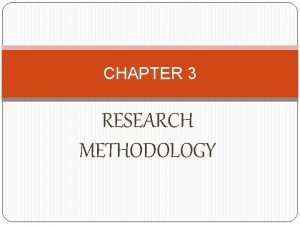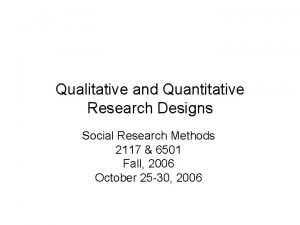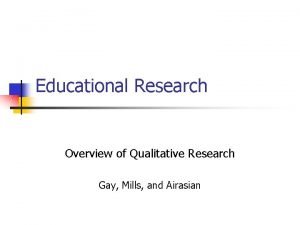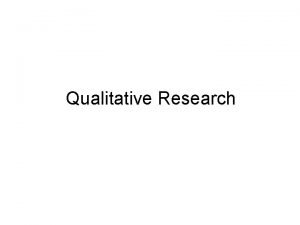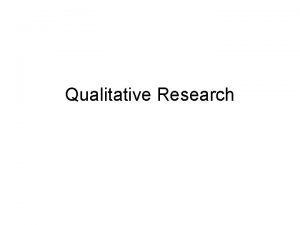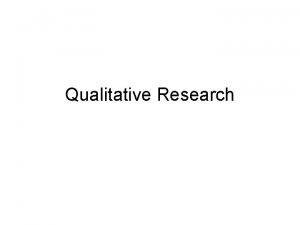Necessity of qualitative research in academia and society











- Slides: 11

Necessity of qualitative research in academia and society Nkoli Ezumah (ezumahnk@yahoo. com) University of Nigeria, Nsukka (UNN) UNN-Author. AID Workshop on Qualitative Research Writing (supported by an Author. AID workshop grant) 9 – 10 Dec 2015

This work is licensed under a Creative Commons Attribution-Share. Alike 4. 0 International License (http: //creativecommons. org/licenses/by-sa/4. 0/)

In trying to discuss the necessity of doing qualitative research what comes to mind are benefits that are derived by using this method compared to using quantitative research.

In academia the purpose of research is to provide an interpretative understanding of social phenomenon. This goes beyond obtaining and presenting measurable and representative statistics about a phenomenon.

Qualitative research therefore becomes necessary in order to obtain the kinds of information that will be relevant in addressing practical implications of research findings both for use in academia and in society at large.

For example Karina Kielmann et al 2011, identified the importance of qualitative research in studying health situations and in particular factors that influence how they experience health and illness. For example they point out that people’s understanding of the body and health in specific cultural context influences their interpretation of what causes illness ad their health seeking behaviour. This may include factors that influence decisions where to seek health care.

Qualitative research is useful in enabling the researcher to obtain the meanings people attach to things and events. For example childlessness is a normal phenomenon, but the reaction of a childless couple will vary according to cultural contexts, how the people interpret such a phenomenon depending on their conceptualization of such a phenomenon, how it will affect the self-image of the couple and likely actions they will take in seeking solution to the problem

Qualitative research is also necessary to enable the researcher to obtain information on the kinds of explanations and rationale that influence people’s decisions and actions. Karina Kielmann et al (2011: 8) refer to this as “the ‘whys’ and ‘hows’ of people’s actions and responses to events that affect them”, which may not be readily obtained using the quantitative method.

Qualitative research is also necessary to understand social institutions such as people’s norms and values that influence people’s lives. This will be useful in providing explanation of phenomenon rather than merely describing them as occurs with quantitative research

In addition Karina Kielmann et al 2011 pointed out that qualitative research is also necessary in the academia in order to complement quantitative data. This is often done either before embarking on quantitative study as a means of exploring a new area, obtaining information to generate hypotheses, or to aid in the development of the instruments for data collection

Secondly it is used after conducting one of quantitative to provide in-depth explanation of the statistical findings.
 What is appendices in research example
What is appendices in research example How to make chapter 3 in research
How to make chapter 3 in research Methodology errors
Methodology errors Purpose of qualitative research
Purpose of qualitative research Modal auxiliary of necessity
Modal auxiliary of necessity Necessity, advisability, and expectations.
Necessity, advisability, and expectations. Possibility and ability
Possibility and ability How to bridge the gap between academia and industry
How to bridge the gap between academia and industry Advokate police
Advokate police Necessity of irrigation
Necessity of irrigation Necessity of fuse
Necessity of fuse Apa saja jenis wirausaha menurut ir. ciputra
Apa saja jenis wirausaha menurut ir. ciputra

